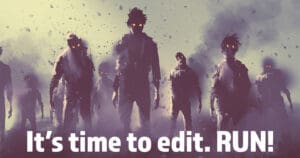English 340 was a roller coaster of a class for me—and not like the little kiddie coasters. This could be a premium ride at Six Flags. Super high highs, super low lows, corkscrews, and at one point I was pretty sure I was upside-down.
Advice for Students Registering for ENG-340 at SNHU
I usually do the advice bit at the end, but this is important, so listen up.
Take this course last. Or, if not last, take it after you've taken the fiction writing workshops (or whatever their equivalents are for the poetry, screenwriting, and non-fiction concentrations).
Okay? Bear that in mind as I recap my experience with the course.
About ENG-340
English 340: Context of Writing is one of two courses in my fifth term at SNHU and my first 300-level class. It's the first of two courses that get into the how-to's of publication (the other being ENG-421).
My instructor was Larry Burns, a published writer who cares deeply about the craft. I assume he enjoys teaching because he was enthusiastic and eager to engage the students throughout the term. He wasn't goofy (I'm over the instructors that post multicolored announcements in Comic Sans) but he was friendly and encouraging.
The first three weeks were great. We covered the various roles of professionals in the publishing industry, learned how to seek agents, and read over query letters from authors published and unpublished.
The Books
I couldn't be more disappointed with the books required for this course. Thankfully, they are both available for free through Shapiro Library, so I didn't waste money on them. Publishing Confidential is extraordinarily negative; the author essentially tells readers not to waste their time trying to make a living as a writer. He unironically and without a hint of humor describes the act of writing a book as “torture.” The book is sixteen years old, and those dang newfangled ebooks are ruining everything! Yeah, it's not good.
A History of the Book in America is a bit newer, 2009, but it's still woefully outdated. And honestly, I don't care about the history of books in America. What happened in publishing after WWII couldn't matter less to my ability to be published in the 2020s. I understand why the English degree program covers the topic, but I don't agree.
We're in the era of electronic publishing. More writers are publishing than ever before. A textbook nearly two decades old about the publishing industry is a poor choice. One that actively discourages writers is inexcusable.
The Trouble with Taking ENG-340 Too Early
In short, if you don't have a fully-realized idea for a novel, you're about screwed. Like a lot of writers, I have a notebook stuffed with ideas, but few have been expanded and none are what I'd call “fully-realized.” Every part of the final project, from the query letter to the synopsis and even the author bio to an extent, relies on the student's complete novel.
That doesn't mean the novel has to be written, just that its bones need to exist. The two-page synopsis needs to cover the plot from beginning to end. The query needs to address character arcs and what makes the work unique.
I've been working on a series for about ten years and figured I could use it as the basis for my work in this class. I couldn't have been more wrong. The series has gone through so many permutations, it's been scattered among so many documents and outlines, that it's unusable. When I go back to working on it (and I will, because the basic premise is sound, even if the particulars aren't), I'm going to have to start over.
And I didn't realize that until week three when I tried working up Milestone One—the first pass at the query and synopsis. I was absolutely wrecked. It wasn't until the Sunday that the milestone was due that I realized I couldn't make my story work for this class and I'd have to scrap it. Looked in my notebook, found nothing usable. I had to come up with something new.
The idea for my novel developed that afternoon and I bashed out a passable synopsis that could be adapted for the query letter. The final project was due just four weeks later, at the end of week seven. Essentially, I had half a term to come up with a viable, coherent story with enough plot and characterization to fill a novel, create a full proposal, and put it all together for the final project.
How It Should Be
We students in the fiction concentration have three workshops in our degree program: ENG-329, ENG-349, and ENG-359. The first (which I'll be recapping in a few weeks!) has students write an original short story. The second has students begin a novel (or short story collection), and the third expands on that project. The natural order is ENG-329 > ENG-349 > ENG-340 > ENG-359.
Not every student walks through the door with a usable story. The fiction writing workshops solve that problem.
The Final Project
Students complete a full proposal for an original written work. There's a 1-page query letter, 1–2 page full synopsis, 2–3 pages marketing plan, and a page for comp titles.
Due to the nature of the assignment, I'm not sharing it here.
I got an ‘A' on it. The result doesn't disappoint me, but… well, you've read this far. You know.
More Advice for Students Registering for ENG-340 at SNHU
- If the school hasn't updated the books for you, skim the reading. Unless you're really into the history of book publishing, just scan for whatever you need. Ignore everything in the Publishing Confidential book. You don't need that kind of negativity in your life.
- Don't be afraid to change up your comp titles and choice of agent as the course progresses. You're going to “choose” an agent at the start of the course, week one. I changed mine twice before the end.
- Do not compare yourself or your story to anything written by Stephen King, Tolkien, Rowling, or whoever the masters of your chosen genre are. What you need is something or someone that an agent is likely to be familiar with. One of your comps could—even should—be a book that your chosen agent represents.
- Students need a complete story to pitch. You need to know how it starts, how the middle plays out, and how it ends. You need to know the character arcs, the themes, and the word count goal. If you don't have a story like that yet, figure it out before week three. If you don't think you can, don't register for this class. Take it later.
- The Query Shark assignment is fun. Remember, though, that every one of those writers thinks their work is worth pitching—just like you, whether now or in the future. Empathize with the writers, don't just blow them off.
- It was in this term that I first had the inkling that certain classes shouldn't be taken in a two-class term. That is, maybe I should do a 1-2-1-2 pattern where I take certain classes on their own. Something to consider, maybe.
In the End
I finished on an almost depressing note. I wasn't happy with the class, wasn't happy with my story, wasn't happy with my project. The A's I got on everything didn't help much because while I understood that I did everything technically correct, nothing satisfied me.
I wanted this class to show me more about the current state of publishing than the books offered. I wanted it to show me more about myself as a writer—which, in a way, I suppose it did.
Final Grade: A (97.9%)
Next week I'll be recapping LIT-229: Mythology. It's more than just learning who Zeus and Thor are.








5 Responses
Thank you. I do have a question not exactly pertaining to this class but would you say that going into the career field of Creative Writing at SNHU was worth it? I am in SNHU now studying Game art and Development and am thinking of making this my minor. I have had both regular English classes, Mythology (which I hated) and Intro to Creative Writing. All of those were a requirement for my BA. But should I make it a minor? I want to self-publish, not really worried about an agent, but know that I need help when it comes to writing. What do you think? And FYI I’m 45 and stay home in a small town that has no jobs. I am trying to make my own job.
Hi, Kim! First, it’s awesome that you’re back in school at 45. Being able to do it online and then to create your own job afterward is a wonderful opportunity.
I earned an Associates in Game Design & Development in 2003. The focus was programming, but I really gravitated toward the writing and game bible creation. I’d say that in game development, even on the art side, having writing experience serves you well. It’s one more tool in your belt, and it makes you more valuable to employers.
As for self-publishing and agents, it’s true that you don’t need a degree to be a writer. What it’s done for me is give me confidence that I can recognize good writing and writing that needs improvement. I struggle far less with trial and error now, and I tend to get things mostly right the first or second (or third!) time around. Going through the degree program also gave me structure and built good habits, but that should be true of any major or minor that you choose.
Whether you make Creative Writing a minor should depend on just two things. Does it make you more marketable? Do you enjoy it? If the answer is a hard no to either of those, then don’t put yourself through the aggravation. If it’s yes, then go for it!
This is incredibly helpful. Thank you for sharing such a detailed blog about this course.
You’re welcome, Kim! I’m glad I was able to help – and saw on your site that you’re looking to finish your degree this year. Congratulations!
THANK YOU! You just saved me. I have been on the fence about this class, and from your description, I don’t believe the class is for me. Thank you for saving my sanity!